Raymond H. Fogler Library Magazine

2023
Since joining the exceptional staff at Fogler Library in October of 2022, I have been reflecting on our identity as an academic library within a land (and sea and space) grant university. We are the University of Maine flagship library and we are also open to the public. Fogler Library – an iconic building and the largest library in the state –accomplishes public outreach in many ways. We are the state-designated Maine Science, Business, and Technology Library. We are a regional federal depository library for Maine, New Hampshire, and Vermont. And we are the only Patent and Trademark Resource Center in Maine. In short, we are a great resource for the University of Maine community as well as all residents of Maine and beyond.
These resources and services transcend our physical space and are part of Fogler’s effort to create digital bridges between academia and the public. Another key tool in this quest is our institutional repository, Digital Commons, which provides digital access to faculty publications, graduate theses, and our Special Collections. In this issue, we celebrate donors Ken Olson and John Webber whose generous donations are helping to sustainably support that connection.
A recent effort to welcome and connect with the public is the Lynch Room, which was reopened and re-envisioned with a new moniker: The Salon, a space for our community to congregate, discuss, and collaborate on

In this issue
4 Shelf Development
A Look at the Library Student Ambassadors
9 New Zoom Space
Responding to new patron needs
10 A Certain Richness
Donor Ken Olson on conservation and preservation
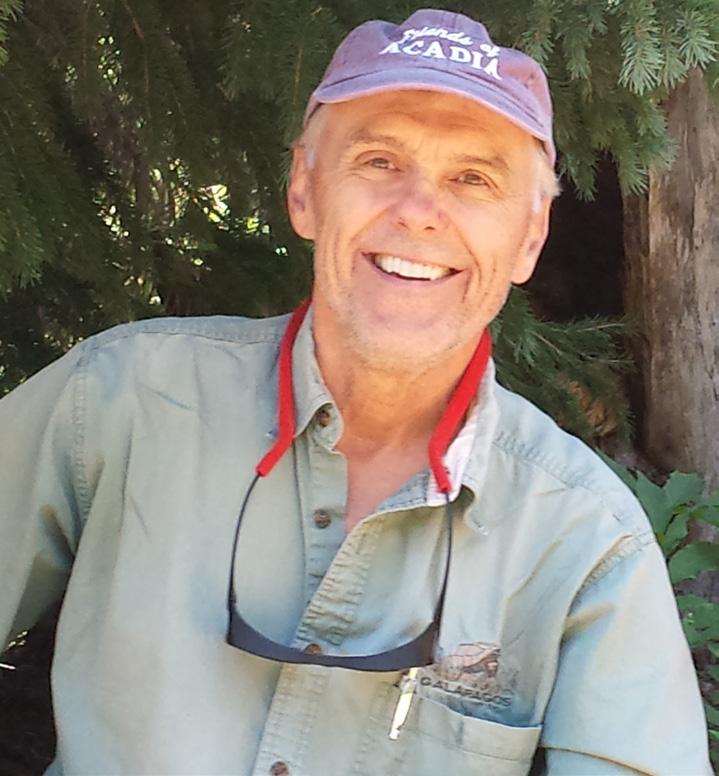
ideas. Please join us at our upcoming multidisciplinary Salon Series featuring rich topical themes that I hope will foster the kind of conversations and action that will be remembered for a lifetime.
10 4 14 16
Also showcased in this issue are various initiatives headed by our dedicated staff. Christopher Clark shares the history of the Library Student Ambassadors who work with Fogler staff to support student outreach efforts. Michael G. Dunn walks us through the interdepartmental collaboration that resulted in the student-requested Zoom space in our Information Commons.
With such a proactive and responsive team, there’s always something going on at Fogler. In our effort to learn what that means to you, we launched a “What’s your Fogler story?” social media campaign, which unearthed touching and comical moments that I hope you’ll enjoy reading about.
Thank you for being part of Fogler. You are welcome here.
Raymond H. Fogler Library Magazine
Editorial Team
Christopher Clark
Michael G Dunn
Daisy Domínguez Singh
Daisy Domínguez Singh Dean of Libraries University of Maine
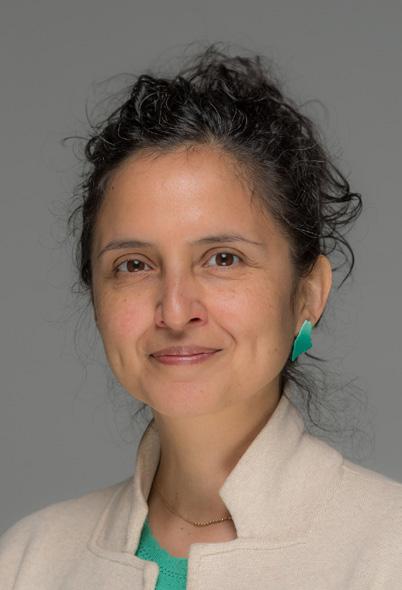
Contributors
Christopher Clark
Matthew Dunlap
Michael G Dunn
Ken Olson
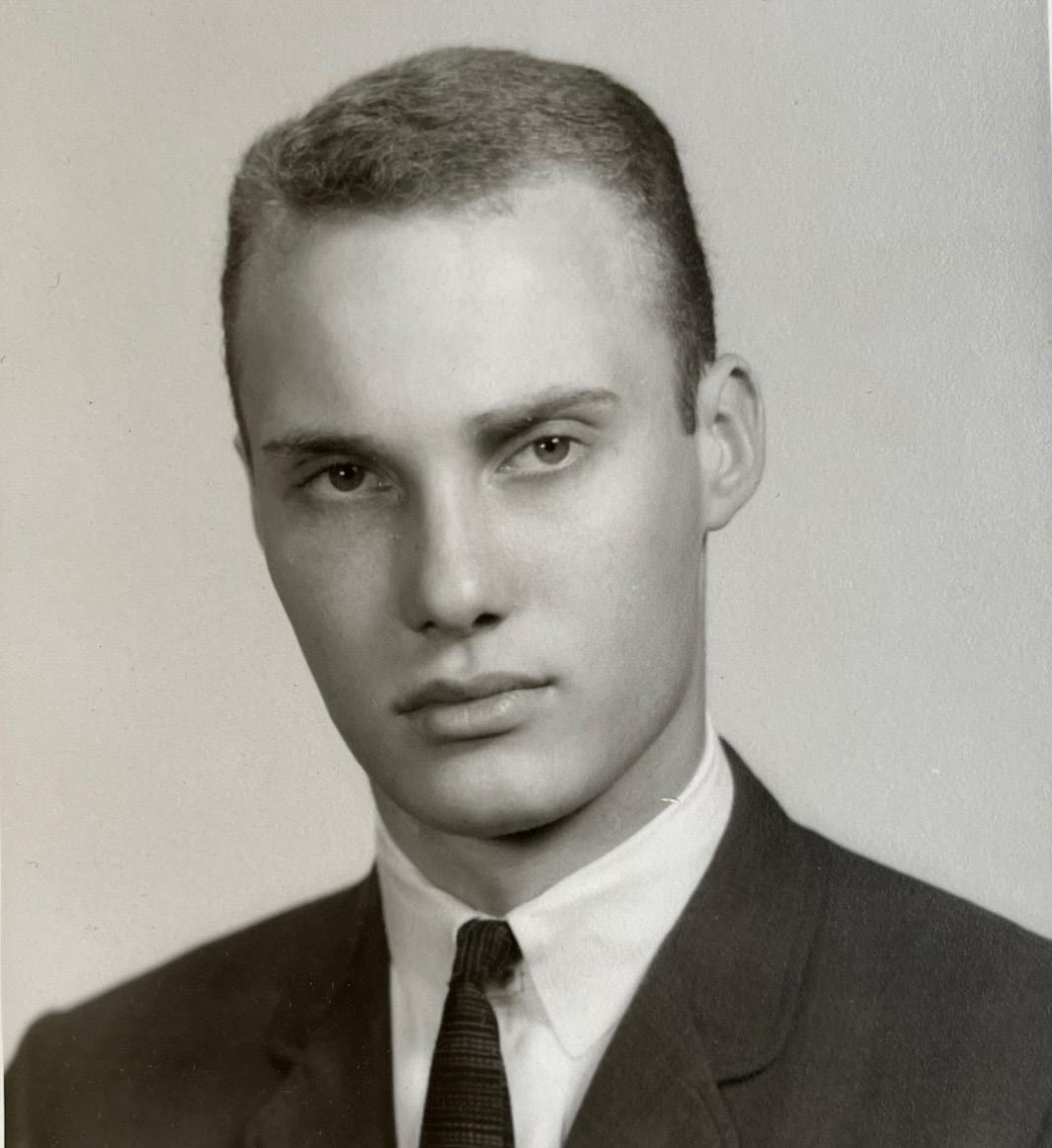
Daisy Domínguez Singh
Design Team
Jenna Davenport
The Raymond H. Fogler Library Magazine is a yearly publication of Raymond H. Fogler Library at the University of Maine. Questions regarding the magazine can be directed to Christopher Clark at christopher.clark@maine.edu.
See page 16 to learn more about our cover photo.
14 From Acorns to Oaks Webber Family’s Philanthropic Philosophy
16 What’s your Fogler story?
The community shares its favorite memories at Fogler.
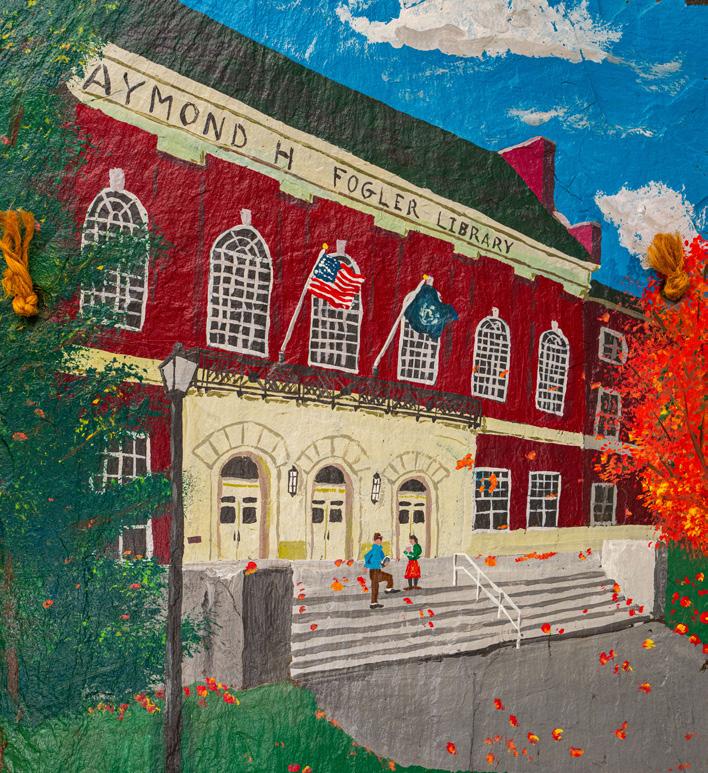
About Raymond H. Fogler Library
Fogler Library is the largest library in Maine and supports the academic and intellectual pursuits of faculty, students, and staff at the University of Maine.
Fogler Library also serves residents, libraries, and academic institutions throughout Maine and the Northeast as the regional depository for federal government publications, an official depository for Canadian federal publications, and the depository for Maine state government publications. Fogler Library is the state-designated Maine Business, Science, and Technology Library, the only Patent and Trademark Resource Center in Maine, and home to The University of Maine Press.
The University of Maine is an EEO/AA employer, and does not discriminate on the grounds of race, color, religion, sex, sexual orientation, transgender status, gender expression, national origin, citizenship status, age, disability, genetic information or veteran’s status in employment, education, and all other programs and activities. The following person has been designated to handle inquiries regarding nondiscrimination policies: Director of Equal Opportunity, 101 North Stevens Hall, University of Maine, Orono, ME 04469-5754, 207.581.1226, TTY 711 (Maine Relay System).

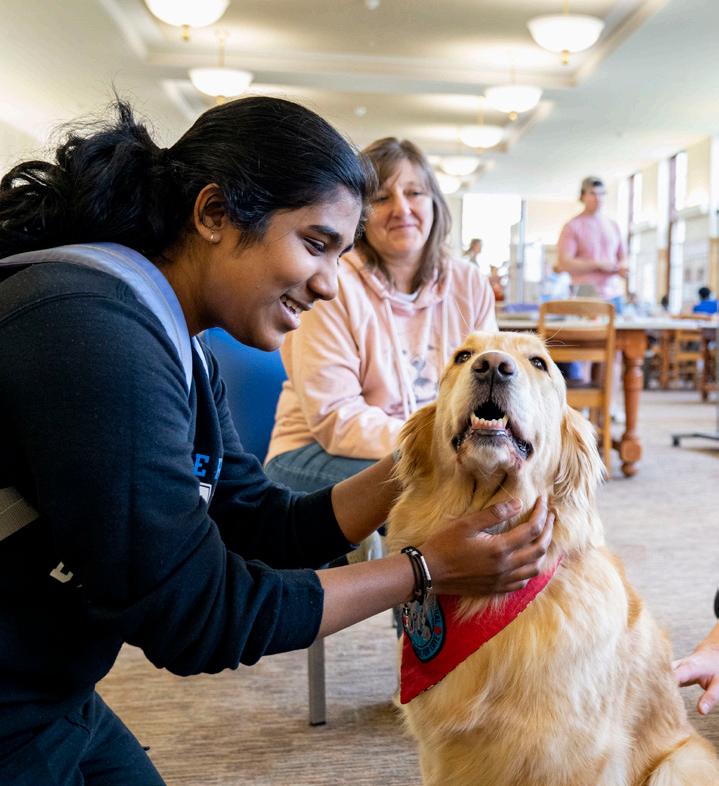
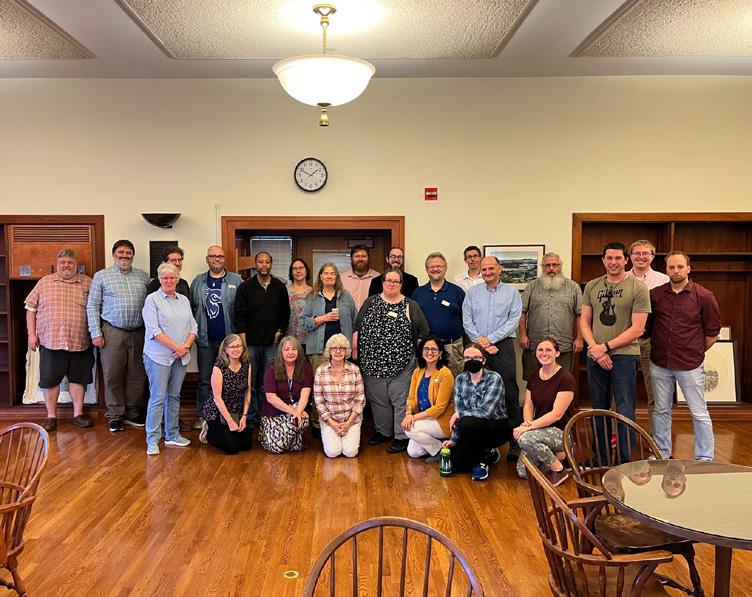
Message from the Dean of Libraries
Shelf Development: A Look at the Library Student Ambassadors
by Christopher Clark
Imagine what it was like during your first visit to the library as an undergraduate. Maybe it felt overwhelming; learning a new classification system to find books, interacting with unfamiliar librarians, or learning how to navigate different and varied collections.
When you are encountering new experiences, often you look to peers within your orbit as guides. We know that students often listen to other students first, relying on first-hand experience within their peer group for instruction and direction. The Raymond H. Fogler Library is committed to making sure that students have some sense of ownership over the Library.
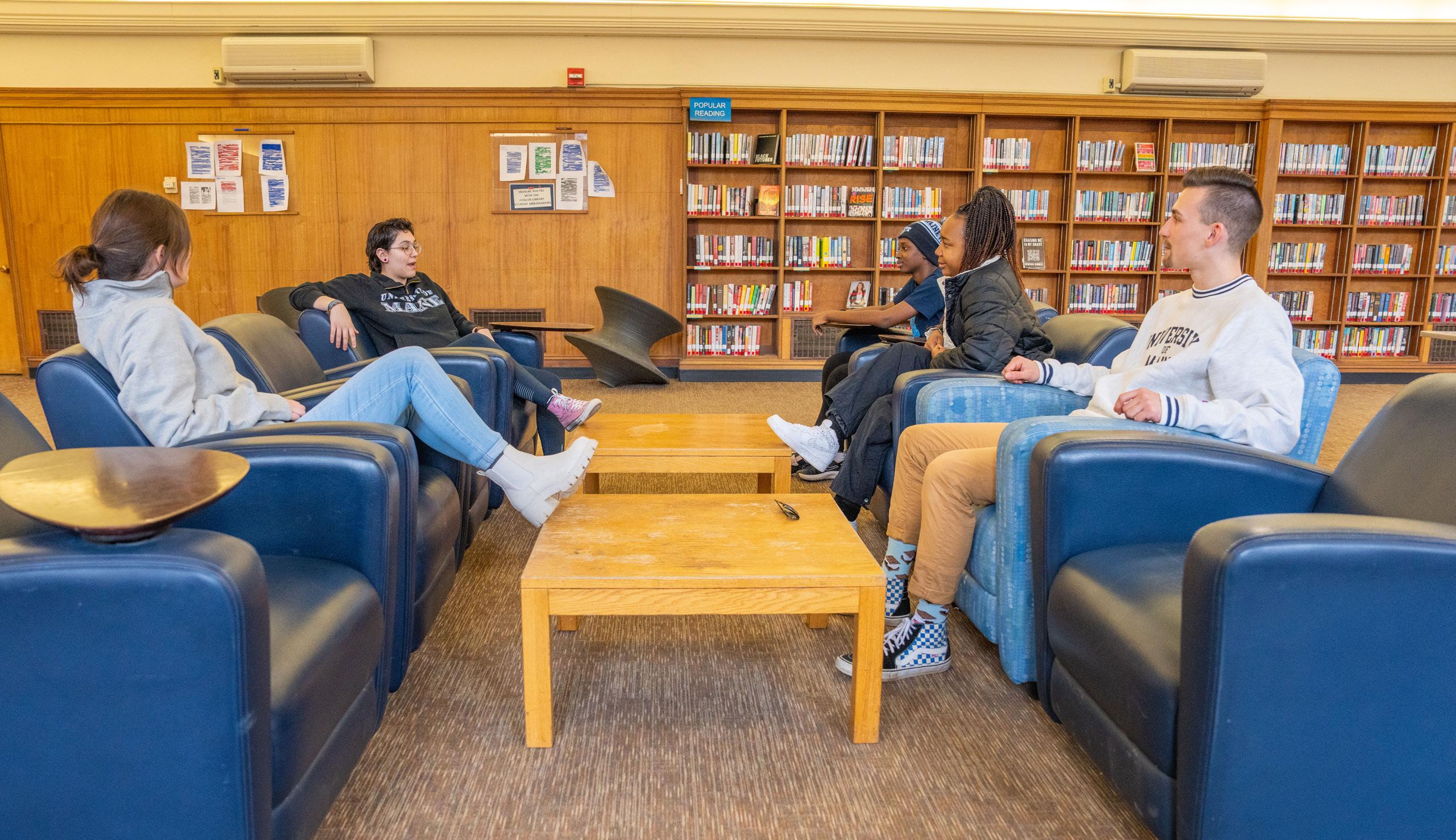
Students are a vital part of our community. Take a stroll through the Library on a typical day in a fall

semester, and you’ll see students using our computer lab, working in study groups, scanning the aisles for research materials, or hanging with friends in our Information Commons or one of the reading rooms. The Library has always centered students and their research needs as its primary focus.
However, Fogler Library extends its reach beyond this, looking to engage students in other ways. Since 2016, the Library Student Ambassadors (LSA) group has worked with librarians to provide input on student needs, marketing and communication among student peers, and education about the functions and services of the Library.
I have had the privilege of being part of LSA for the
Students meet in Fogler's Reserve Reading Room.
library.umaine.edu 5 4 Raymond H. Fogler Library Magazine 2023
Photo courtesy of the Division of Marketing and Communications
last year, and it has been an enriching experience as a longtime library professional. Having worked in several academic libraries throughout the years, I can tell you that LSA is something uncommon and special.
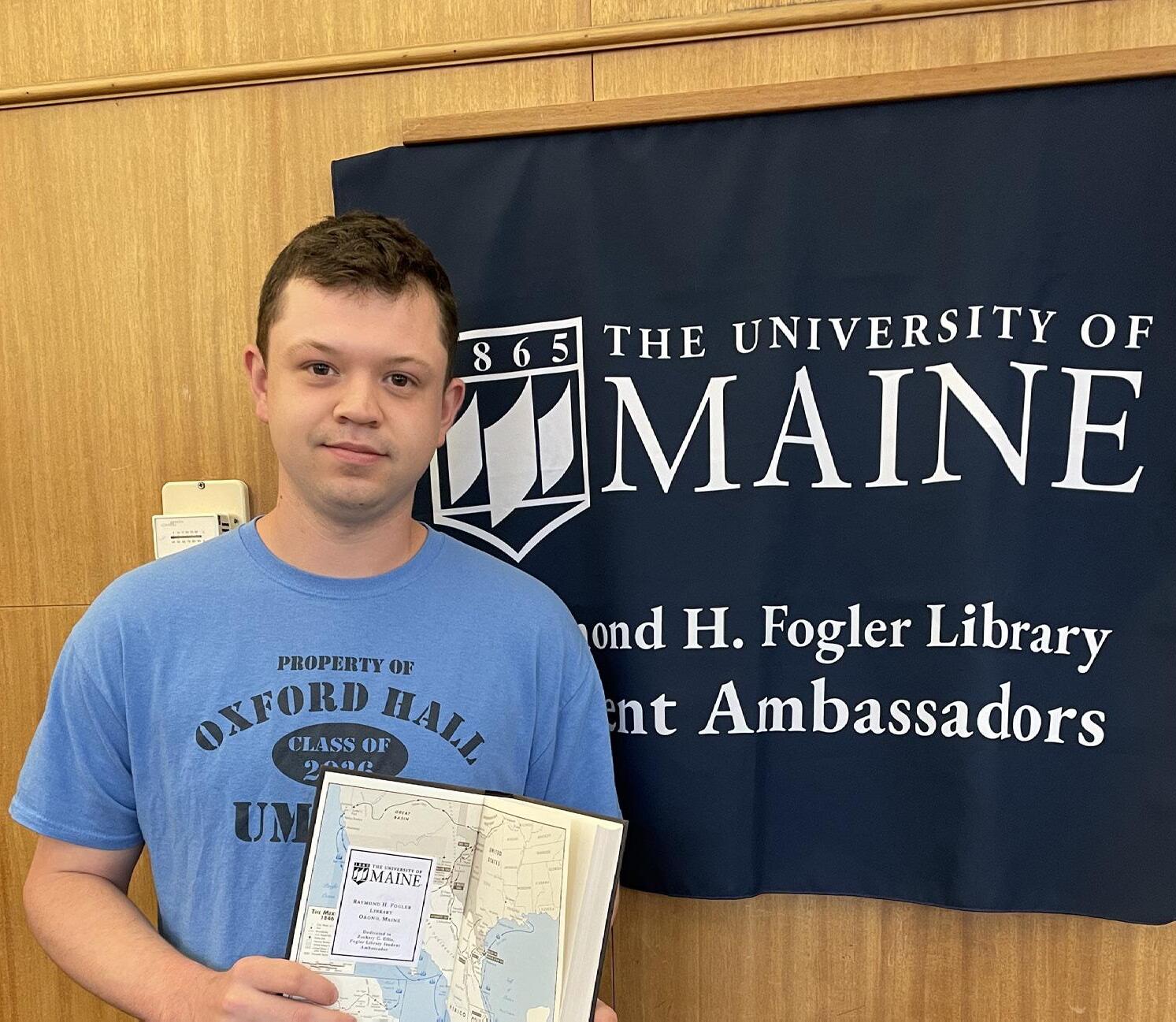
In addition to student outreach, the LSA often looks to other libraries as a way of augmenting library knowledge. Recently, the Student Ambassadors were able to get a peek into the special Archives at the Bangor Public Library. LSA does its best to promote awareness of other libraries, both academic and public, to give students better insight into the unique issues faced by different libraries.
I recently spoke with Lindsay Decker, Science Reference Librarian and current coordinator for the LSA and its associated activities. In describing the mission of LSA, she mentions that “[t]he student ambassadors are a group of exceptional undergraduates who volunteered and applied to be student ambassadors
so that they could act as almost liaisons between library staff and their fellow students.”
When asked about what makes our student ambassadors special, Decker highlights “[t]heir enthusiasm and their ideas.” These ideas may include possible improvements to library services or spaces, but also ideas for events that LSA organizes and/or participates in each semester.
One of the most popular events in which the LSA participates is serving as ushers for the Therapy Dog days twice a year at Fogler–once in Fall, and again in Spring, both during Finals Week. Therapy Dogs and their owners come to the library to help students de-stress. The LSA is crucial in assisting library staff to make sure the volunteers have a positive experience.

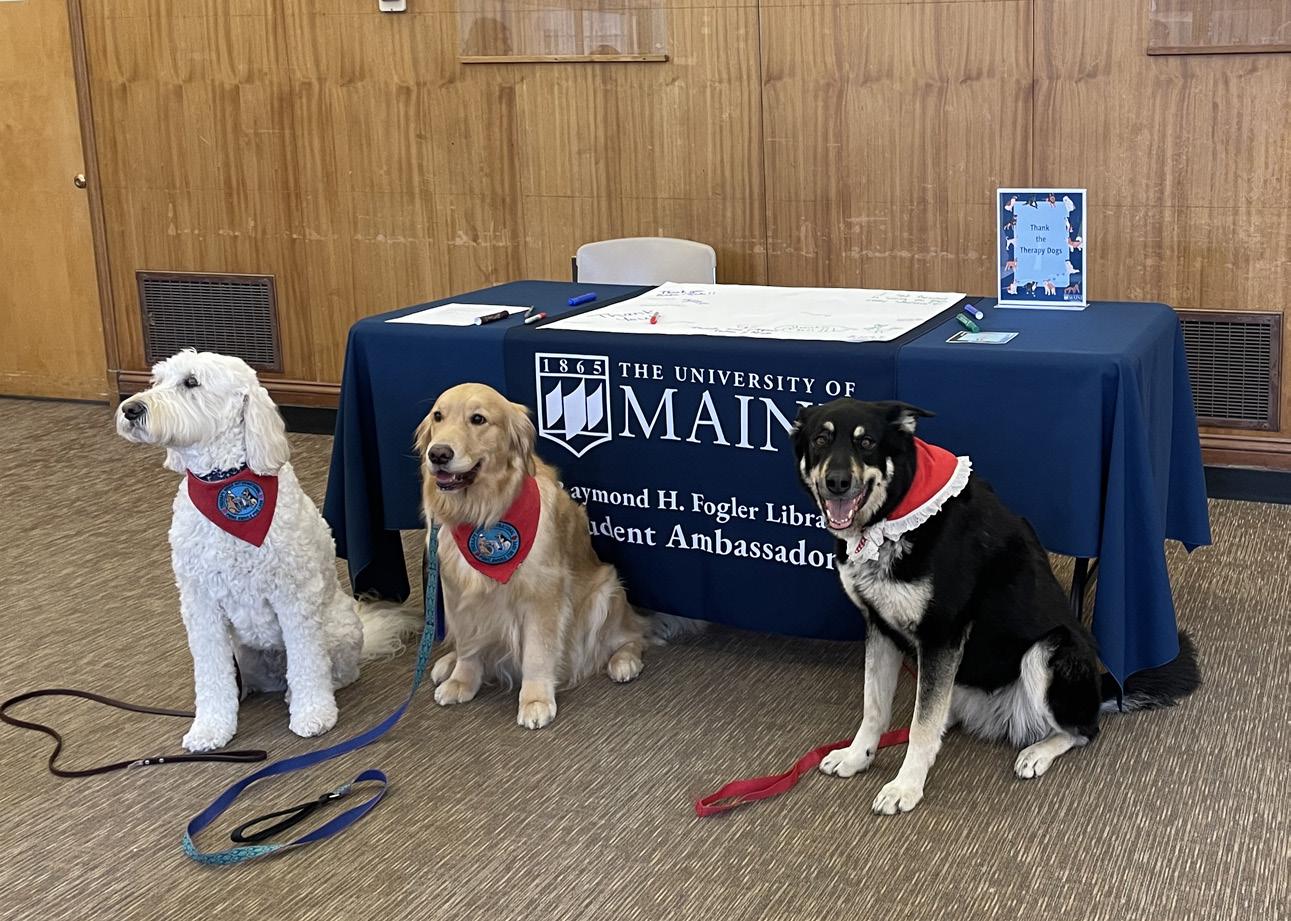
LSA volunteers helped the Fogler Library during a discussion organized by the Research & Instruction
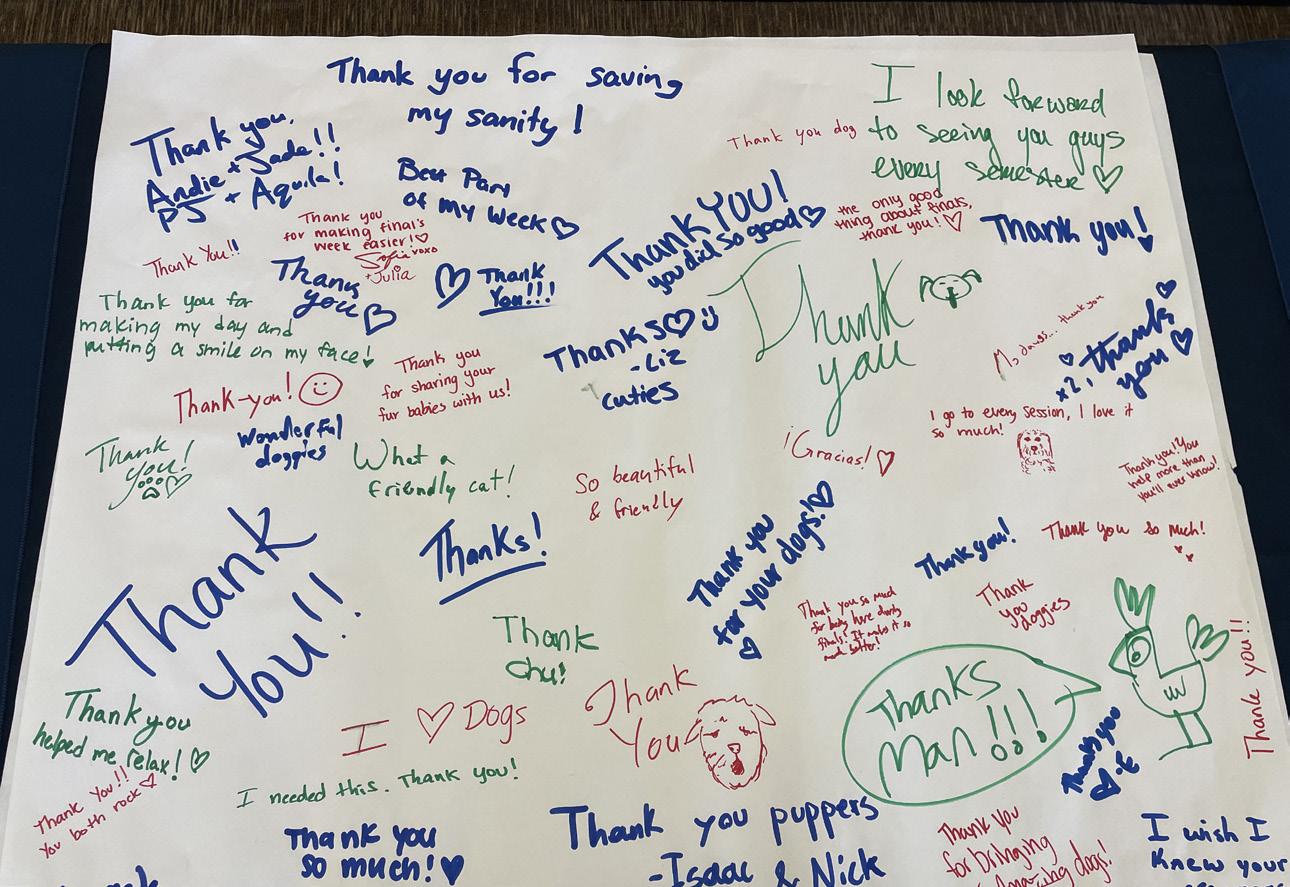
Department. The discussion explored book banning, provided important historical grounding and context, and was open for all attendees to share their thoughts.
Over the last few years, the LSA has run the Tournament of Books. This tournament takes the format of March Madness and usually takes place in parallel with the basketball season. Books are listed in brackets, usually by theme (i.e., fantasy novels, nonfiction, “classic” books, etc.) Patrons are encouraged to vote in the brackets, with a clear winner emerging after several rounds. This year, The Priory of the Orange Tree was declared winner of the tournament.
In addition to events, the LSA routinely seeks broader student feedback. Sometimes, this includes regular rotating posters featuring prompts that students are invited to answer. Whether encouraging readers in a Tournament of Books, assisting canine friends in visits to the library, or learning about local historical collections, the LSA provides a meaningful conduit for engaging students. Often what unites them is a love of libraries, and fond recollections of early library
experiences.
The LSA serves the greater goal of making the library a “third place.” In addition to the workplace and the home, it’s important to cultivate a third space where people can congregate, meet, chat, study, and so on. There are lots of different kinds of third places: churches, clubhouses, and more. The Library, as the heart of the university, makes a natural candidate as a third space for students, where they can practice being a professional, study outside of class, or read across a range of interests. The LSA is there to facilitate that idea as ambassadors and models.
Being a member is designed to be an empowering, educational experience. Members often use their time with the Library as a way to springboard into new careers. Some have used it as a way to explore getting their Master’s degree in Library Science, while others have gone on to work for NASA, serve in the Coast Guard, or publish creative works. LSA welcomes all students of all interests, areas of research, and majors.
"The Raymond H. Fogler Library is committed to making sure that students have some sense of ownership over the Library."
Left: Students leave notes thanking the therapy dogs for their library visit. Right: The therapy dogs are always a highlight of the year for the LSA.
6 Raymond H. Fogler Library Magazine 2023 library.umaine.edu 7
Left: A student ambassador sharing a bookplate that commemorates their service Right: Student says hello to therapy dog.
How does one become a Student Ambassador?
According to Decker, there is typically a call on social media at the beginning of the semester. LSA is a great opportunity for students who wish to contribute to the Library’s mission. It can be an important learning experience.
If you or someone you know is interested in applying to be a Student Ambassador, you may reach out to Lindsay Decker at lindsay.decker@maine.edu.

A NEW ZOOM SPACE HAS COME TO THE FOGLER LIBRARY
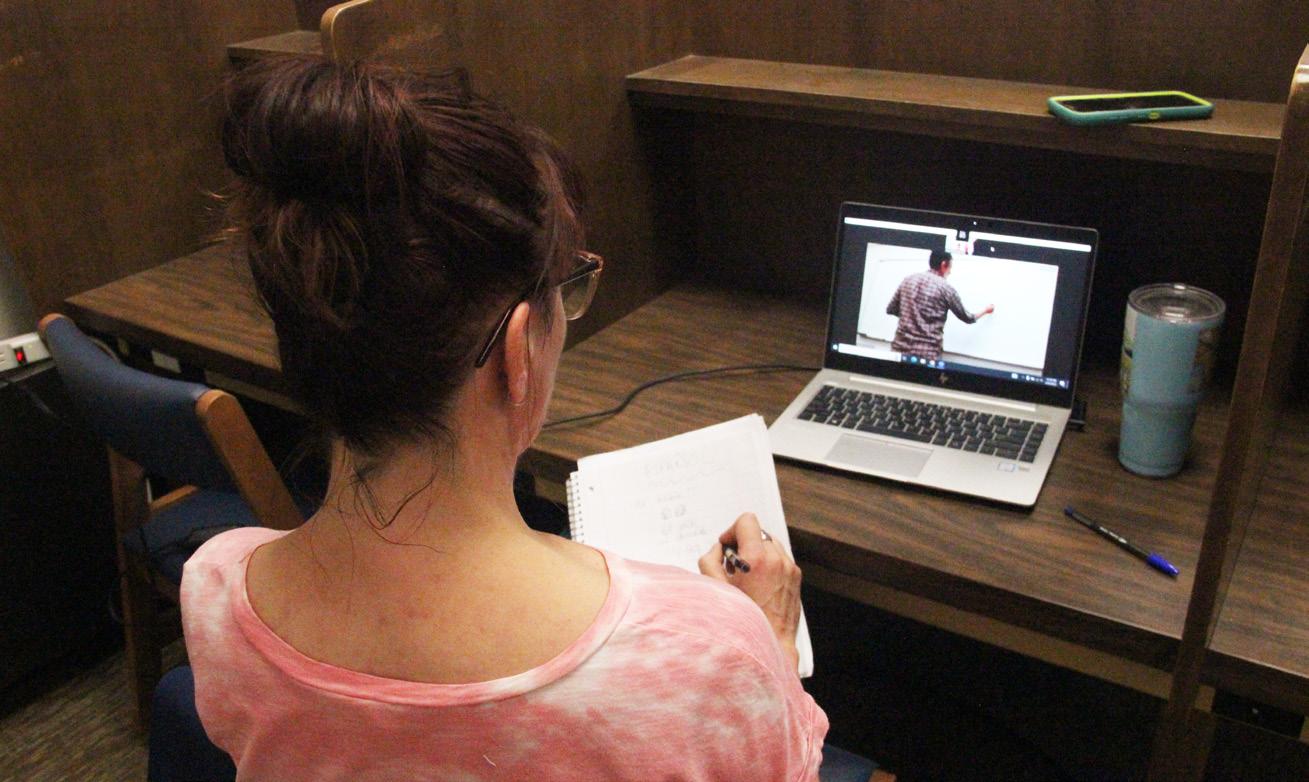
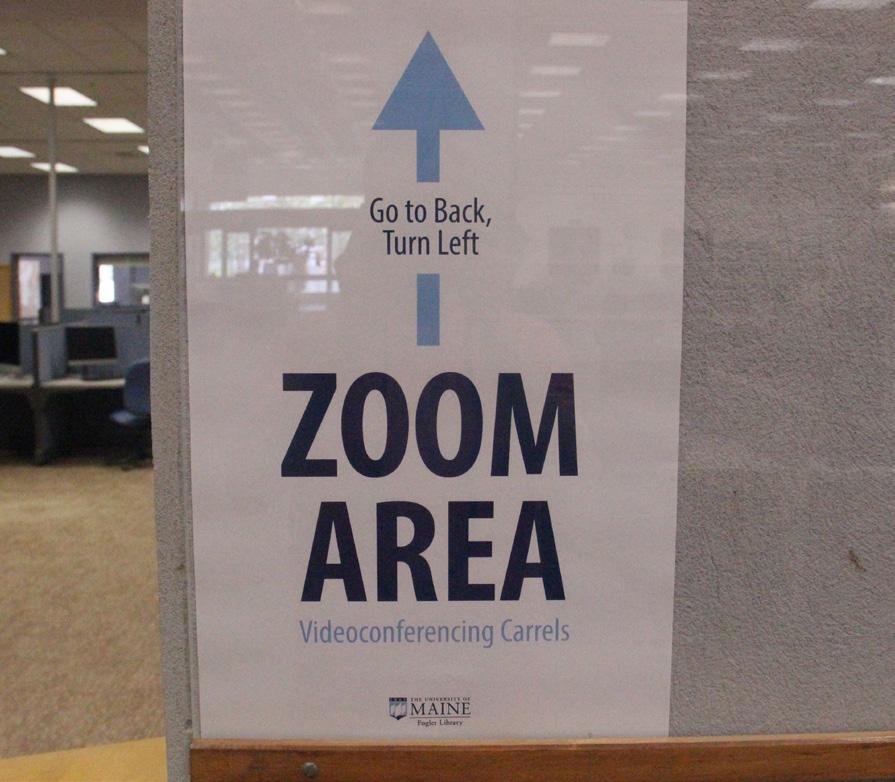 by Michael G. Dunn
by Michael G. Dunn
Following academic and technological innovations implemented in response to COVID-19, there was a sudden rise in the need for accommodations of video calls for online classes, video interviews, and virtual meetings. Far from a temporary response to a once in a century event, this blend of in-person and online interaction has come to represent the new normal for our current and incoming students. In a slight irony, prior to COVID, patron need was trending the other way, with a rising need for group and social spaces. The Library had met that need by shifting the miles-long collection to open larger spaces on its second floor and creating larger spaces for students to convene, as well as offering reservable Group Study Rooms. However, like everything else after COVID, things changed, and quickly. So, in keeping with its strategic plan to be a center of learning for the University community, Fogler Library needed to pivot and adapt yet again.
While there have always been silent subfloors with numerous nooks and side spaces, there were no formal purposeful designs for video conferencing. That is no longer the case. n April 2023, Fogler was pleased to make available to students and the community a new Zoom Space for upwards of seven patrons to individually use at once.
Following the submission of an idea by two Circulation Department staff members responding to
student requests for a Zoom space, a collaborative effort was made between the Library Advisory Council, the Office of the Dean, the Space Committee, the Research and Instruction Department, and the IT Department to make this idea come to life. In an adaptive and tactful move, the creation of the Zoom Space was made possible by repurposing and reimagining two separate underutilized spaces. Once the plan was finalized, study carrels that were largely unused by patrons in the second floor Reading Room were moved to an often overlooked part of the Information Commons.
The Zoom Space consists of solid and comfortably sized study carrels arranged to maximize a patron’s privacy and allow for a professional presentation in the background for the Zoom call. An IT Specialist as well as a Reference Librarian are within walking distance for any technical or academic needs that might arise. Power strips are also provided to keep devices charged in case a busy schedule prevents prior preparation.
With signage guiding the way, the Zoom Space offers its users the benefit of reducing distractions--such as outside conversations, pass-through foot traffic and departmental staff work--while also being on a floor where talking isn’t discouraged. For the convenience of students’ busy schedules, the space is available without reservation.
The Lynch Room has been reopened with a new moniker – The Salon. The Salon is a re-envisioning of this space as a place for our community to congregate, discuss, and collaborate on ideas. The newly minted multidisciplinary Salon Series, with rich topical themes, will foster the kind of conversations and action that will be remembered for a lifetime. Please join us!
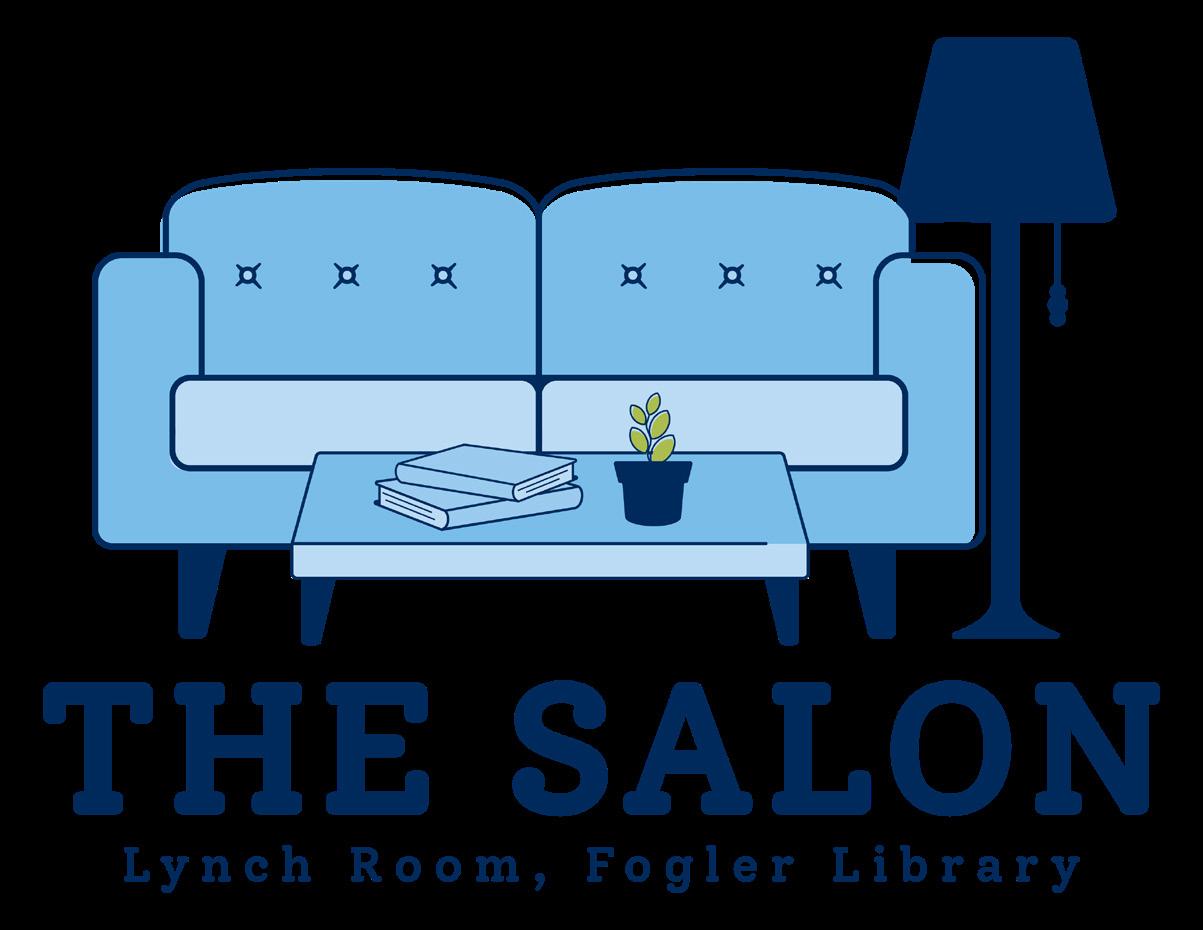
"Being a member is designed to be an empowering, educational experience."
library.umaine.edu/salon
8 Raymond H. Fogler Library Magazine 2023 library.umaine.edu 9
The University Archives in Fogler Library has welcomed new guests: five Bananas T. Bear mascot costumes! The costumes came to us from the Office of Student Life, who were displaying the costumes in the Memorial Union. These previous incarnations of the mascot costume had been worn by the fraternity brothers of Sigma Xi Chapter of Alpha Delta National and the former Alpha Phi Omega fraternity who volunteer each year to take on the role of the muchloved Bananas T. Bear. The earliest of the costumes dates back to the late 1960's when the first Bananas suite replaced the previous practice of having live bear mascots.
A CertAin riChness
by Ken Olson
Dean of Libraries Daisy Singh asked me to write about my decision to donate my professional and personal papers to Fogler and endow their curation.
For twenty years of my three-decade conservation career, I was privileged to head three nonprofits—The Nature Conservancy of Connecticut, American Rivers, and Friends of Acadia. I served in other executive capacities at the Appalachian Mountain Club and The Conservation Fund and volunteered on charitable boards. After retiring in 2006, I began assessing whether my accumulated materials might be useful to others.

In researching archives a couple of years ago, I was fortunate to talk with Paige Holmes, a University of Maine Foundation philanthropy officer who, with enthusiasm, connected me with then-Dean of Libraries Joyce Rumery, who liked the description of my collection and that I wanted to fund its stewardship with an estate gift. Fogler’s Special Collections later accepted The W. Kent Olson Conservation Papers.
Foundation General Counsel Sarah McPartlandGood handled transactional matters. These included my deeding the documents to the university. (Foundation
and Fogler staff had earlier picked up the first tranche, thirty-four file boxes, and loaded them into a moving van. Fifteen more boxes destined for Orono remain with me until I can organize them better.)
During COVID, Joyce and Paige gave me a video tour of Special Collections at Fogler and at its Annex, where users can access entire collections. The building looked as cavernous as the massive warehouse in the closing scene of Raiders of the Lost Ark, with an infinitely long central aisle offset by rank upon rank of towering storage shelves.
View from the top of Cadillac Mountain, Acadia National Park Photo courtesy of Patrick Wine
10 Raymond H. Fogler Library Magazine 2023 library.umaine.edu 11
(UM
Ken Olson, UM 1968, was a Senior Skull and captained the varsity soccer team. He holds a master’s from Yale and was a faculty lecturer there and at Wesleyan University. In 1995, College of the Atlantic awarded him an honorary degree for “outstanding contributions to Human Ecology.”
A guide to his Fogler papers is available in the Digital Commons (search "Olson (W. Kent) Conservation Papers, 1931-2011 " by Special Collections, Raymond H. Fogler Library, University of Maine ).
See UMaine News article “Fogler receives the W. Kent Olson Conservation Papers.”
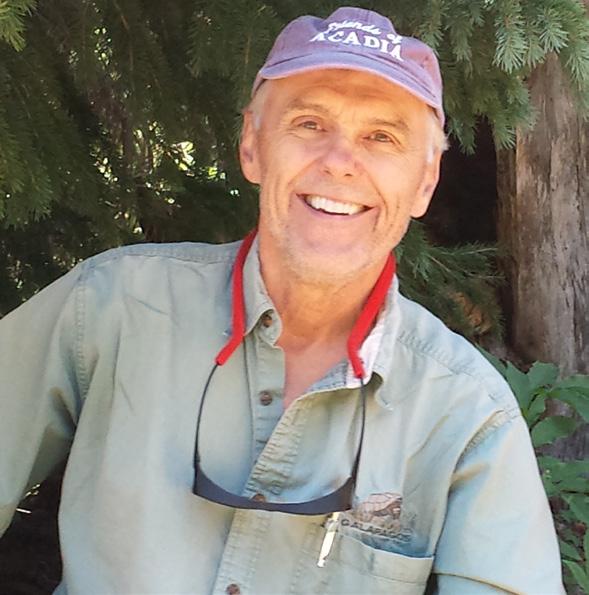
My papers are not the Kissinger or Obama or George Mitchell or Olympia Snowe collection, not in volume, nor completeness, nor worldly significance.
So, why think to make one’s niche oeuvre public?
Answer: The conservation ideal itself motivated me.
Conservationists try to think hundreds if not thousands of years ahead. The Utilitarian philosophers (1700s-1800s roughly) spoke of achieving “the greatest good for the greatest number of people.” To which, in the early 1900s, Theodore Roosevelt’s U.S. Forest Service Chief Gifford Pinchot added the phrase “for the longest period of time” and applied the utilitarian formulation to public lands. Today we have national forests and other multipurpose domains on which Pinchot’s “wise use of natural resources” prevails (timber harvesting, power production, mineral development, grazing, etc.). But we also have preservation areas such as national parks and monuments, local land trust properties, etc., that emphasize ecological protection, wildlands experiences, scenic values, cultural richness, general ambling, and so on.
Of such mountains, rivers, forests, swamps, seas and skies, Thoreau said (in the male slant of the day): “A man is rich in proportion to the number of things he can afford to let alone.”
Conservation and preservation are compatible, and when paired they comprise sensible land policy. As did my paid job, my documents embody that objective. I wondered if they might have utility post-career, including after I shuffle the mortal coil. Could my life work continue beyond my work life? Maybe someone would want to see how a conservationist, alongside inspiring staff and volunteers—nonprofit endeavor is a we proposition—tried fair to execute his responsibilities. There were sizeable successes and ample failures, but I was mindful always of unborn generations. Humanity will be richer for what we, the current pilots of Spaceship
Earth, either let alone or treat with managerial kindness: harvest and succor the fruit, but leave the resource verdant and sustained.
The second reason for offering my collection relates to the nature of philanthropy, literally “love of humankind generally.” Charity is not about money only, it’s more about intent to serve. Although I am not wealthy in the conventional sense, I felt that donating the scriven symbols of my land-grounded vocation aligned with the objectives of a land grant college, especially one operating in a place where utilitarian and preservation philosophies co-exist, where a grand, useful, diverse, and ecologically vital landscape is unparalleled in both natural beauty and economic function.
Indeed, as Daisy Singh wrote, my collection complements Special Collections assets such as the Great Northern Paper Company Records, the Dickey-Lincoln Hydro Project Collection, and the Sewall Aerial Photographic Collection. Perhaps that utilitarian trove combined with my docs can constitute the foundation for a Maine Conservation Archive and encourage conservationists, nonprofits and resource industries to build on it? With additional space and adequate staffing, could Fogler become a nationally important repository of American environmental enterprise?
Meanwhile, I hope my papers will serve anyone interested in conservation history. They contain materials on classic battles in the making and long-term management
of Acadia National Park, Allagash Wilderness Waterway, and Katahdin Woods and Waters National Monument. Other documents deal with nonprofit engagement in natural resource politics and policy; developing, governing, and managing environmental organizations, especially land trusts and national park friends groups; and working relations between government and philanthropic partners. My papers on conservation and non-conservation topics include published books plus published and unpublished essays, reviews, op-eds, fiction, honest poems, and frivolous ditties.
The intended audience is the scholarly research community, of course, but also students, writers, policy specialists, agency employees, nonprofit executives, and the interested lay public.
As a nonprofit CEO I understood keenly the imperative to manage daily business well, which requires fluid operating funds, the hardest kind to raise. So I cobbled a modest trust naming Fogler Special Collections and Friends of Acadia equal beneficiaries. At my death they will divide the net principal. Fogler will use its portion’s annual interest to curate my collection in perpetuity—i.e., to conserve and preserve.
I remain grateful for my Maine undergraduate education and hope others will also choose to return value in whatever ways, and at whatever levels, fit their philanthropic bent.
They will be enriched.
"The second reason for offering my collection relates to the nature of philanthropy, literally 'love of humankind generally.' Charity is not about money only, it’s more about intent to serve."
“
There were sizeable successes and ample failures, but I was mindful always of unborn generations. Humanity will be richer for what we, the current pilots of Spaceship Earth, either let alone or treat with managerial kindness: harvest and succor the fruit, but leave the resource verdant and sustained."
12 Raymond H. Fogler Library Magazine 2023 library.umaine.edu | 13
Photo courtesy of Judith (Gibson) Hiester
1968).
From
updates on the Digital Commons
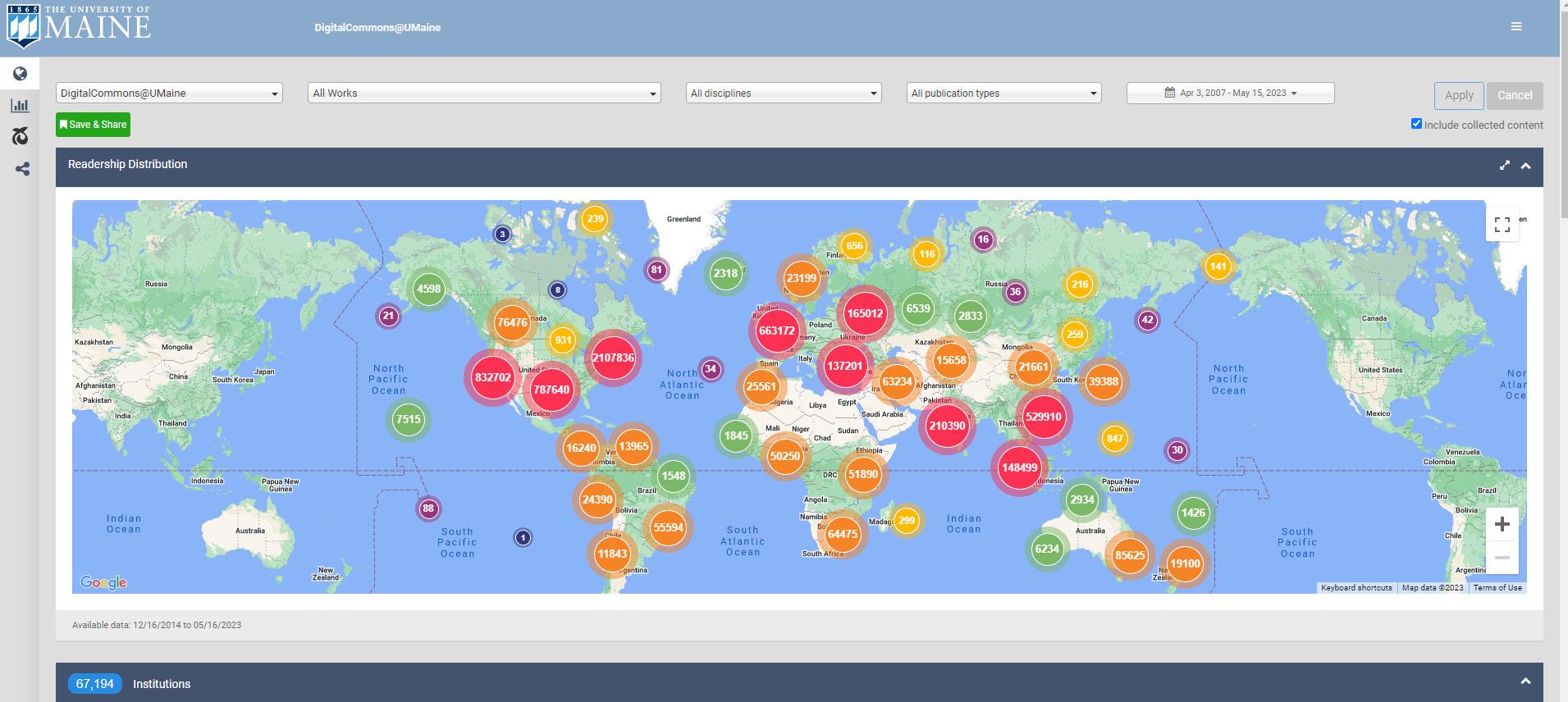

Fogler Library is continually working to increase the digital content available through its institutional repository, Digital Commons. The University of Maine Electronic Theses and Dissertations (ETD) project, a joint effort of Fogler Library and the Graduate School, provides full text access to a large number of these works, primarily from 2001-present, but with scattered theses that have been scanned retrospectively by special request.
Other popular Digital Commons collections include annual reports of the towns in Maine, the Maine POW collection, the Wabanaki Collection, the Maine Women's History Collection, and our collection of University Archives relating to the history of UMaine. We also have been working to increase the available content of the Northeast Folklife and Oral History Collection.
Steven
his grandfather G. Peirce Webber. John Marshall Webber, 1960s. After a tour of Fogler’s Special Collections department, Gregory Curtis, Head of Special Collections, posed with Mr. Spetnagel, Mr. Webber’s daughters Andrea Webber and Karyn Bournival, and his son-inlaw Mike Bournival. Photograph taken by Paige Holmes.
FROM ACORNS TO OAKS: WEBBER FAMILY PHILANTHROPY
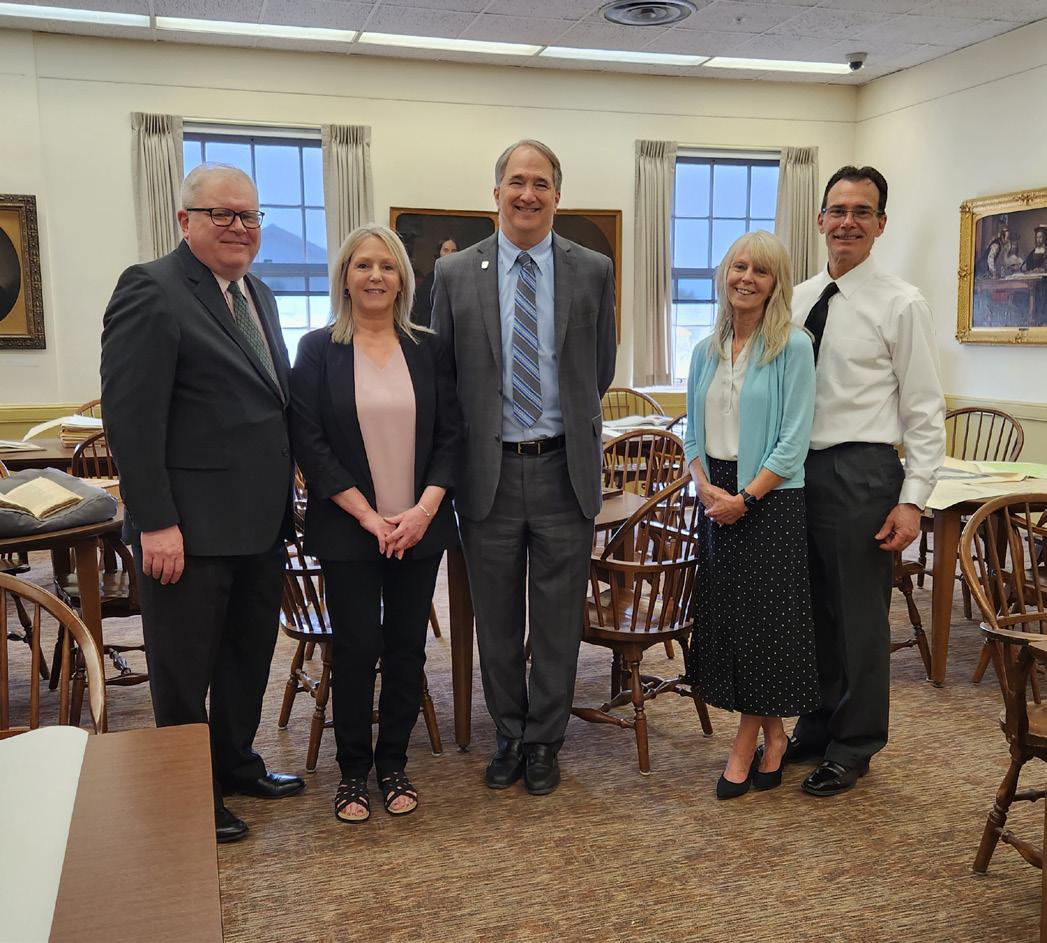
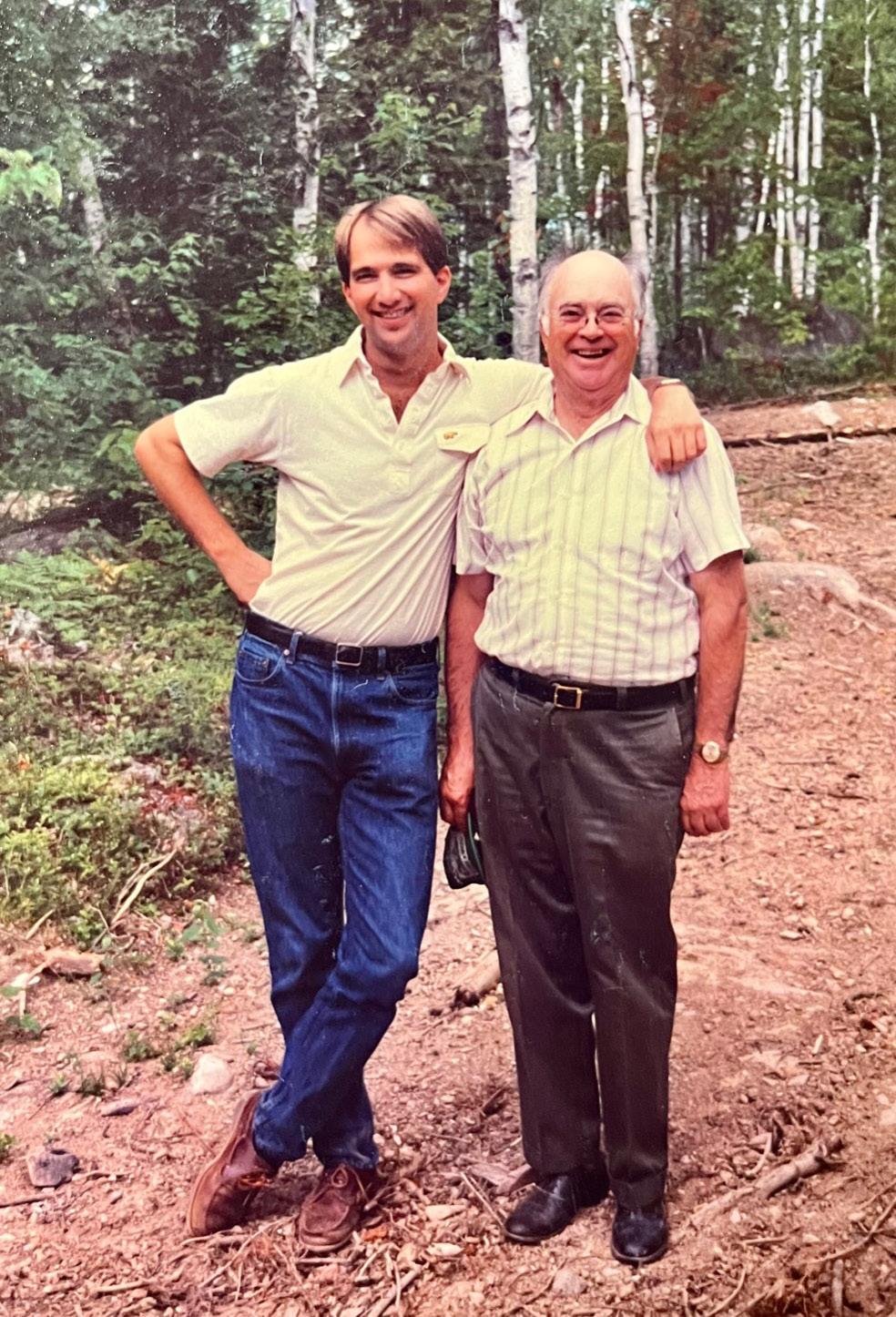 by Daisy Domínguez Singh
by Daisy Domínguez Singh
In 2007, John Marshall Webber, UMaine Class of 1970 and longtime member of the Friends of the Fogler Library Advisory Board, created the John M. Webber Fogler Digital Library Fund to support the purchase and creation of digital collections. When he passed away in 2022, he bequeathed an additional $1 million to this Fund, making an indelible contribution to Fogler patrons near and far. Mr. Webber also bequeathed $1 million to provide additional scholarship assistance to University of Maine business majors.
Mr. Webber became a benefactor following in the footsteps of his parents, Mr. G. Peirce and Florence Webber, who were long-time supporters of Maine and the University of Maine community. During the Webber family’s recent visit to Fogler, Mr. Webber's nephew Steven Spetnagel shared his grandfather’s philanthropic philosophy. G. Peirce Webber thought of the acorn as a symbol for philanthropic efforts. Every little bit counts; planting a small acorn can grow a mighty oak tree. An apt metaphor, since digitization of Special Collections materials will extend our physical shelves like digital branches reaching out to the entire world.
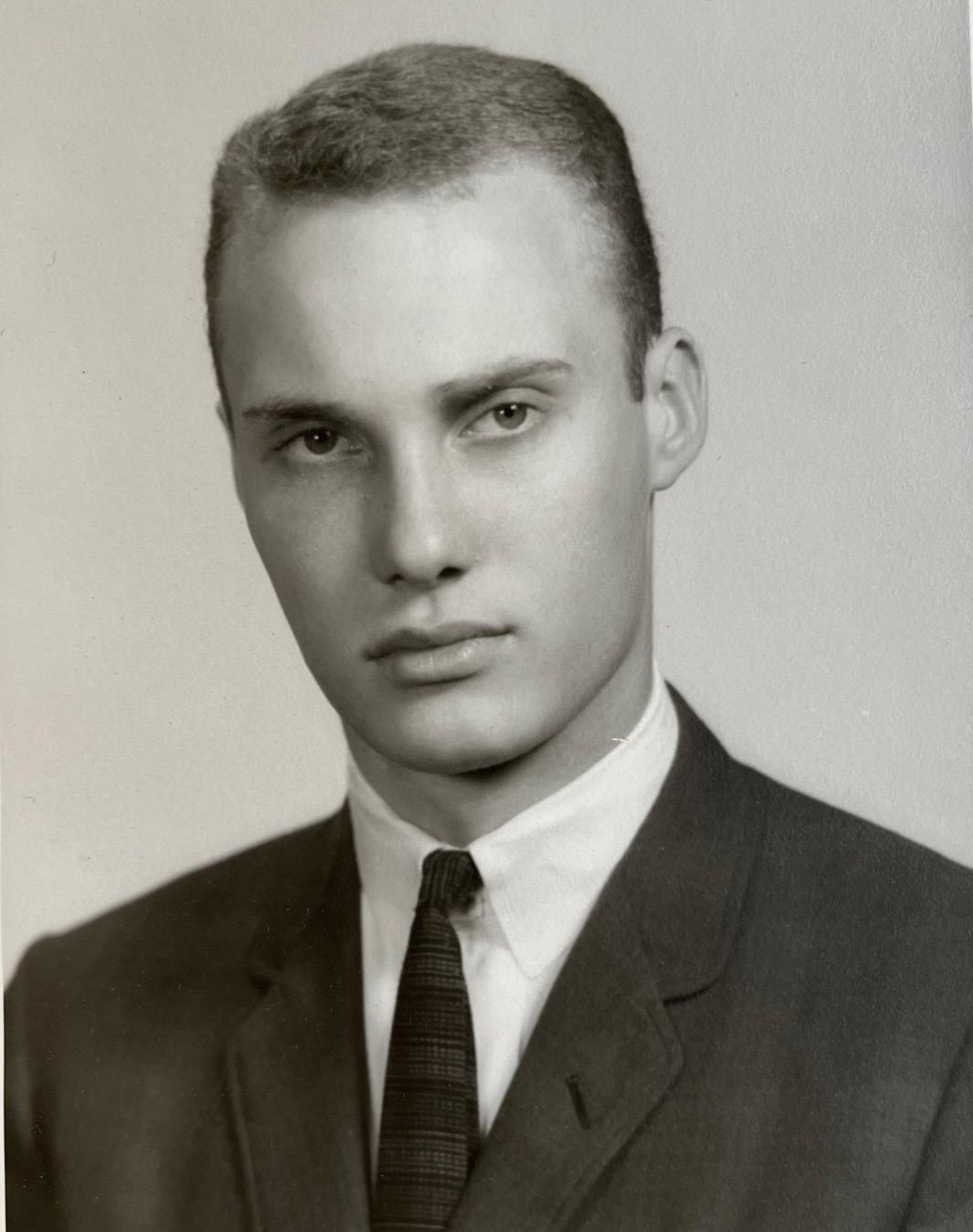 left:
Spetnagel with
left:
Spetnagel with
of UMaine Digital Commons work worldwide.
Downloads
14 Raymond H. Fogler Library Magazine 2023 library.umaine.edu | 15
"My parents, Jane Quimby '58 and Mark Biscoe '57 met in January of 1957 in the Reading Room at Fogler. He asked "May I sit here?" and the rest was history. Sixty one years of marriage and a Black Bear daughter, son in law, and two grandchildren. This picture was painted of my parents by my late husband Tom '97. The slate was sourced from the roof of Fogler Library during renovations when Tom was the Project Manager for the job."
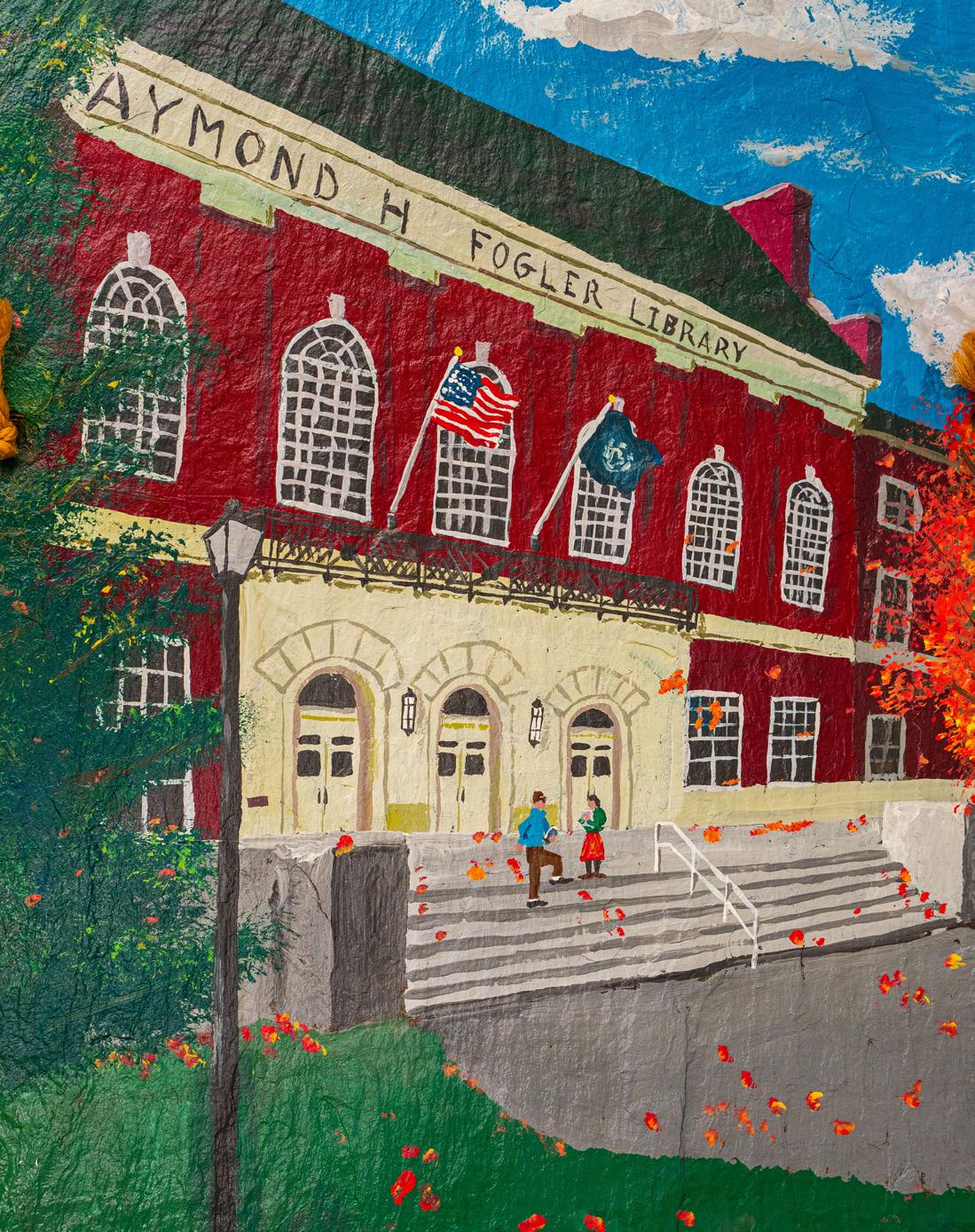 Katherine Biscoe Turlo '93
Katherine Biscoe Turlo '93
The iconic Fogler Library holds special meaning for many. We recently asked the public “What’s your Fogler story?” and received some great responses.
What's Your Fogler Story?
by Matt Dunlap
Was it that long ago?
Of course we had phones. Every dorm section had a phone booth at the end of the section. The phrase “look it up on your smart phone,” though, probably would have drawn stares of concern from people who cared about us.
In the mid-1980’s, the internet wasn’t really a thing— at least not on college campuses, not yet. Research, then, meant going to the library, trying to figure out what to look for in the subject index of the card catalog,
and then hoping that no one else had taken out the book you were looking for and needed for a class paper. Then, to write up your notes into the required paper, we had access to rental typewriters in what is now the reserve reading room. It was a different time; a time that did not favor the habits of procrastinators.
I may have been a somewhat distracted student— now, in the fullness of time, I can say I was more or less indifferent about schoolwork. Subjects I liked came easily; requirements, though, found a worthy challenge in competing for my attention.
It came to pass that I was enrolled in a political science class1 regarding United States Foreign Policy. As was my wont, I barely glanced at the syllabus, and hid my surprise when the professor gave notice that our mid-term research paper was due in two weeks.
Despite my lack of organization and prioritization as an undergraduate, one bit of zeal that served me well as both an undergraduate and graduate student was the true affinity I felt for Fogler Library. Just being in there gave me a sense of comfort; as I did my work and studied there, all the tension and anxiety of putting things off simply slid away. I got pretty good at finding resources. This time, though, I had roped myself into a stumper.
The topic of my mid-term research paper was the Iranian hostage crisis of 1979-81. The Iranian revolution that deposed the Shah of Iran cascaded into an avalanche, and when students stormed the American Embassy in Tehran, embassy staff were taken completely by surprise; 52 Americans were taken hostage. The crisis helped bring down President Jimmy Carter, who lost the 1980 election to Ronald Reagan; the day after Reagan took the oath of office, the Iranians released the hostages.
Now, I had to write about it. The crisis had evolved relatively recently, and there wasn’t a lot of scholarship available on the incident. On a rainy Saturday morning, with the paper due in just a couple of days, I did the only thing I knew to do: I went to Fogler.
I couldn’t find much. There were some abstracts, lists of magazine and newspaper accounts from the time; but that meant pawing through reel upon reel of microfilm. I didn’t have time. I took a deep breath
and sat in a soft chair in the reference room. Think. How am I going to do this?
Then, out of the corner of my eye, a thought. In the reference section—a mysterious compendium of atlases, encyclopedias, and collections of general research material—hidden in the middle of it all was a low, long bookcase. Phone books; every phone book in the country.
I had an idea. I wonder, I thought. Organized by state, I found the thick phone book for Atlanta. Curiously, I fingered the alphabetical listing, and there it was; the offices of former President Jimmy Carter.
In my head, I wondered how I was going to fill in the gaps. Maybe some select news stories; some after-action analysis of the Desert One disaster, when a cargo plane and helicopter collided in the Iranian desert during the aborted rescue mission, killing a number of American servicemen, which only made a bad situation worse. I could put something together. Primary sources were plum, as I knew from my history classes. Reaching anyone at Carter’s office on a Saturday was a long shot. But still, I thought, it’s worth a try.
My mother had given me a long-distance calling card so I could call home every week and check in with my folks. In the lobby of Fogler, there were a couple of phone booths; one with a pay phone, the other with a credit-card phone. Armed with Carter’s office number, I slid into the booth, and dialed the number. It rang and rang; after a while, the realization began to set in that I was probably peering down a dead-end alley.
“Hello?” a gentle voice answered the phone. I jumped a bit. I introduced myself, apologized for
Clarity of perspective is helpful here. I was a history major as an undergraduate. My real focus was on my work as a student-athlete, and I was content with a modest GPA. I never dreamt of being involved in politics, public administration, or later in the work as State Auditor. My eight years in the Maine House of Representatives (six as chair of the Inland Fisheries and Wildlife Committee), my time as an Executive Director of a statewide non-profit, fourteen years as Secretary of State, and now my time as State Auditor, were preceded by not a single Public Administration class, neither wildlife management nor any accounting or auditing classes, and four political sciences classes, including the one described here. I failed one of the other three.
16 Raymond H. Fogler Library Magazine 2023 library.umaine.edu | 17
calling during non-business hours, and stated what I was working on.
“University of Maine?” he asked. I affirmed. It was Jimmy Carter himself, in the office on a Saturday morning, getting caught up on some things. He had heard the phone persistently ringing and decided to answer it.

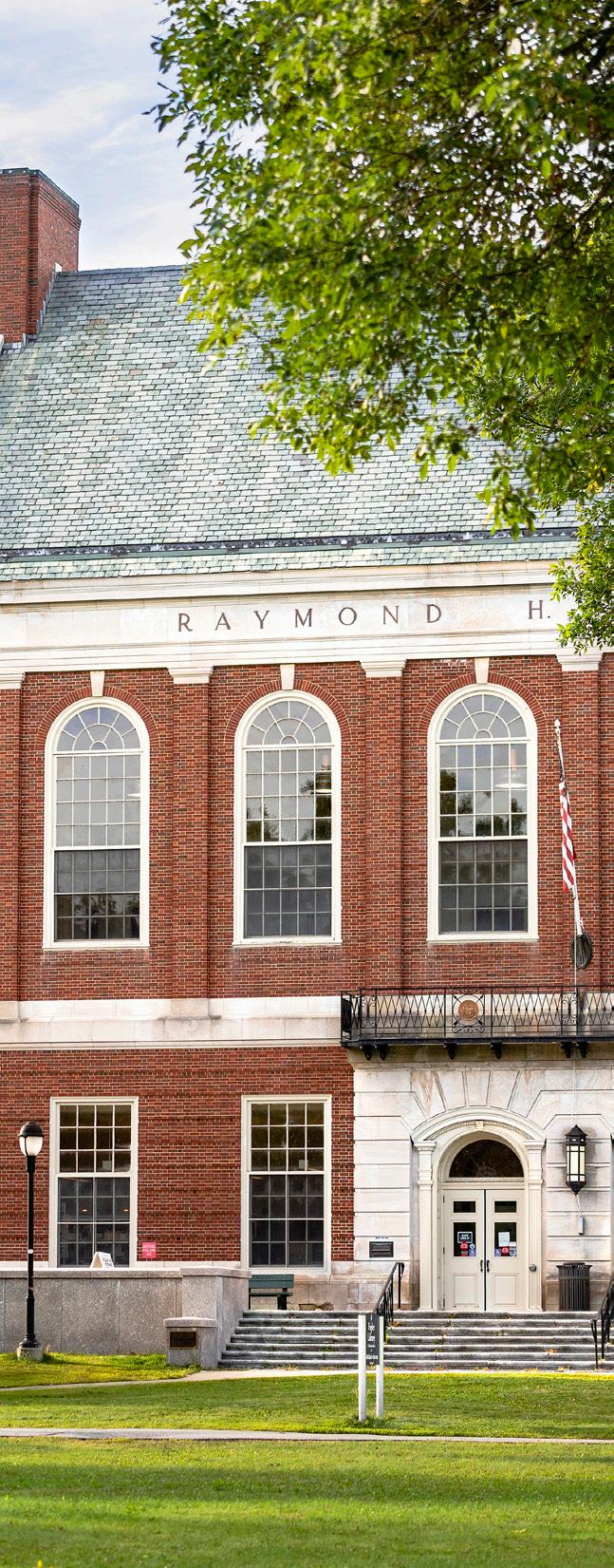

The next few minutes were a blur. He was incredibly gracious and laughed a bit at some of my questions. “I can’t answer all of that,” he’d say. “Classified, you know.” But I had what I needed. He wished me well, and I thanked him.
Breathless, I went to work.
I’m sure I had written better papers, but few I had more confidence in. I was surprised, then, when the paper came back from the professor with a big, red F circled on the back page. After class, I approached him about what on earth I had done wrong. He was decisive in his answers. The paper, he said, was a borderline mockery. “I’m not stupid,” or something to that effect, was his assessment of my listed primary source of Jimmy Carter, and he said something about how if I had been a political science major, I’d probably be meeting with the dean, and that I should feel good about just failing the assignment.
I didn’t back down. I insisted on the truth of my work, and described how I had found Carter’s office number, and even the date I had called the office— which, of course, was pretty close to the date the paper

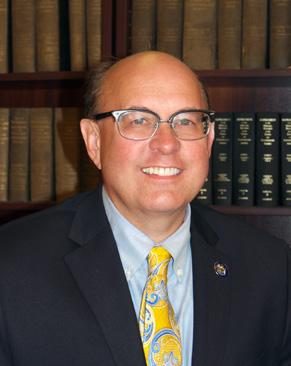
was due. He took the paper back but gave me a skeptical look. I was a bit distraught and told no one of my situation.
A couple of weeks later, at the end of class, as the professor handed back the famous ‘blue books’ that were used for written essay exams after a test, with mine was also the suddenly-radioactive research paper. As I turned to the back page with a sense of dread, everything suddenly lightened; the red F had been revised to a red A. My eyes shot up, and the professor, looking at me, smiled and shook his head.
He, or maybe a graduate assistant (I was never sure which), had re-performed my work; they had found the phone book and the number, and had called the office. The office assistant, puzzled by the request, said she would look into it. A couple of days later, she called back. Yes, she said, the President confirmed that he had spoken to a University of Maine student on the date in question.
Later in my academic journey, while working for the legendary Carroll F. Terrell of the English Department and the National Poetry Foundation, I had to find some information. Terry gave me a piece of advice that not only have I never forgotten, but that fit perfectly for my blind groping for research sources that rainy Saturday in Fogler Library. “The key,” he said, “is to know what you’re looking for. When you find it, it will stand out—like blood spattered on the page.”
Come to think about it, after all these years, who really needs a smart phone?
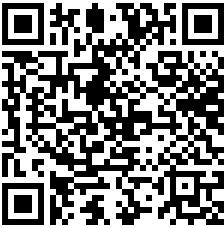
What's your Fogler story? Scan the QR code to share your story with us.
Offices in Orono & Portland 207.581.5100 | 207.245.3656 800.982.8503 umainefoundation@maine.edu umainefoundation.org The <33 of the College of Our Hearts — Support the library today. our.umaine.edu/fogler 18 Raymond H. Fogler Library Magazine 2023
Matt Dunlap is a member of the Class of 1987 with a bachelor’s degree in History and earned a master’s degree in English in 1994. As a member of the Maine House of Representatives, he chaired several committees, served seven terms as Secretary of State, and currently serves as Maine’s State Auditor.
Fogler Library
5729 Fogler Library
Orono, ME 04469-5729
library.umaine.edu @UMaineLibrary @foglerlibrary


















 by Michael G. Dunn
by Michael G. Dunn






 by Daisy Domínguez Singh
by Daisy Domínguez Singh
 left:
Spetnagel with
left:
Spetnagel with
 Katherine Biscoe Turlo '93
Katherine Biscoe Turlo '93





